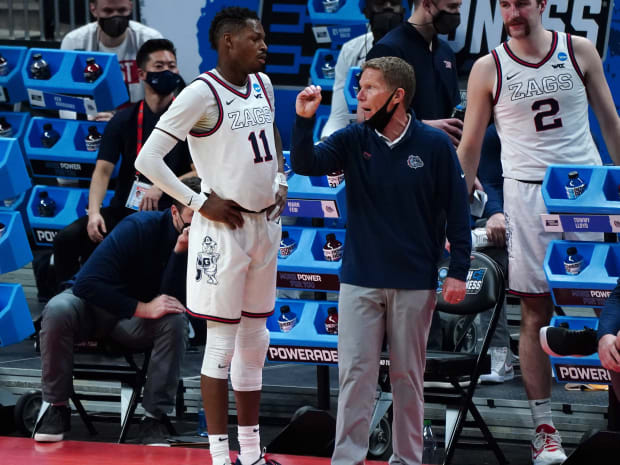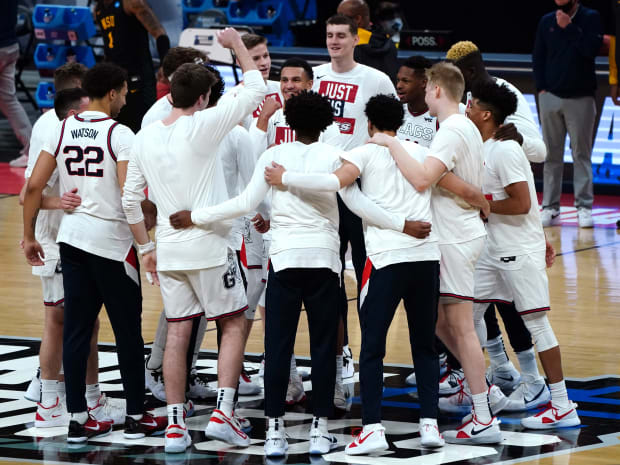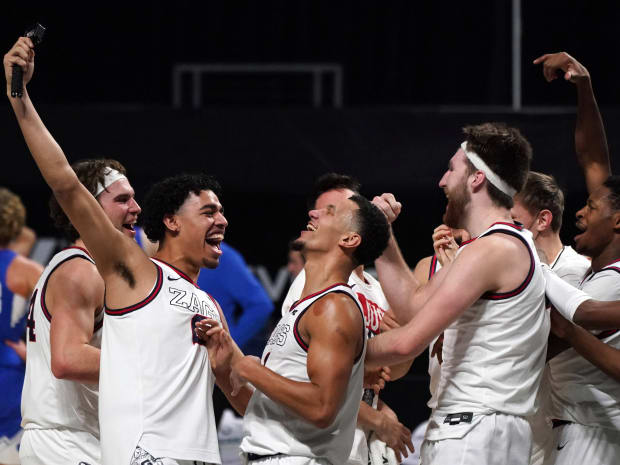The Bulldogs start their weeks with Personal Growth Mondays, a time to refocus on what really matters.
Early into the 2020–21 college basketball season, Travis Knight gathered the undefeated Gonzaga men’s basketball team together on a Monday. Knight is, by business card at least, the Zags' “assistant strength and conditioning coach.” But as he showed on this Monday, same as most Mondays, his job title is as understated as the basketball power that sprouted in Eastern Washington more than 20 years ago.
There were no coaches in this meeting, no administrators and no university staff— and the group was designed that way, to be small and exclusive and open to new ideas. That afternoon, Knight stood before the Bulldogs and a projector screen, upon which a YouTube video had been paused. Several players shot curious looks his way when Knight said he wanted them to learn about vibrations and their inherent power, through this exact clip, which showed someone scattering sand atop a metal table, then vibrating the table with something called a “tone generator.” The higher the tone, the more the sand split into patterns; higher still, these patterns became increasingly intricate. “It felt like unlocking the secrets of the universe,” says junior guard Joel Ayayi with a laugh. “Or something.”

Knight, like usual, had the Zags’ rapt attention. He told them that vibration is something that’s felt and experienced and understood but not actually spoken about. “And,” he says, “that our vibration needed to be more about mastery than about trying to meet the expectations of others, or caring about rankings.” If Gonzaga could set a higher tone regarding basketball mastery, it followed that the Zags would become the sand in the scenario, forming together, in increasingly elaborate configurations, by feel and understanding. Or something.
If this meeting sounds unusual, consider what happened next: Gonzaga recalibrated, ran through a brutal nonconference schedule of mostly ranked opponents unscathed, won all 15 West Coast Conference games and reached yet another men's NCAA tournament—its 22nd straight appearance—with 26 victories. Good vibrations all around (and apologies for the dad joke).
The Zags are still undefeated, in no small part because of Knight, his innovative training methods and what the Gonzaga program refers to as Personal Growth Mondays, a Spokane staple for the previous three seasons. Should the Zags become the first undefeated men’s basketball team in more than 40 years, they can thank PGMs as much as PPGs.
“The biggest thing in that space that’s really developed is helping them be more connected, not only to each other, but to the moment and this surreal year,” Knight says. He notes that college students exist in a perpetual state of distraction—classes, friends, dating, futures to be figured out—and that’s before factoring in a global pandemic, a national recession and a long-needed racial awakening. It’s easy, Knight says, “to sometimes lose track of how special it is—what you’re doing.”
BISHOP: How Gonzaga Zagged
The Monday meetings began in 2018, as Knight sought to develop a “soul-level connection” at a program defined both by the million games it had won and the one it never had. The Bulldogs had already began to bolster their mental performance training, after a series of early tournament exits, the worst being a 2013 fall to Wichita State that prompted Coach Mark Few, Knight and others to seek growth outside of simply finding more talented players or more diabolical offensive and defensive schemes. Players took retreats together and competed to see who could unlock escape rooms the fastest. And those events were both great and necessary, in that they strengthened bonds and made those teams more cohesive. But the exercises, given how few there were, felt more like injections, Knight says, rather than a consistent, methodical follow through. Gonzaga advanced to the national title game in 2017, only to lose in the final minutes. Close but not yet there.
All of which is how Knight came to visit with Brett Ledbetter before the 2018–19 season. Ledbetter created the organization What Drives Winning and Knight wondered if he could implement the tenets of Ledbetter’s philosophy on the basketball court, as teams throughout sports have done more often in recent years.
Ledbetter details the early steps of that partnership in a video on his company’s website. In the clip, he shows a slide of Few’s record by season—the worst: only 23 victories—and lauds Knight’s “vision.” The performance consultant met with both Few and Knight before that season, helping them to settle on four core aims that all tied together: develop internal leadership, de-activate resistance to growth, become response-ready for adversity and manage high expectations. All of that might sound simple. It most definitely is not.
Next, Ledbetter advised Knight to have his players make a list of the three things in their life that most got in the way of success. Then they divided those lists into buckets, one for “human” issues and one for “sports” ones. There were dozens of human issues. In sports? Not a single one that anybody listed. That reinforced to Knight the need for consistent, holistic care—and thus PGM was born.

The form took various shapes. Knight didn’t want to overwhelm the players, so he started by limiting the meetings to around five minutes. It soon became clear that he’d need more time to allow for questions and deeper dialogue. Most Mondays, they spoke for 15 minutes or so, sometimes longer. Thus the weekday known for doldrums came to “set the tone,” Knight says, for the rest of the basketball team’s week.
That first year, with a talented team but not many vocal leaders, PGMs helped the Zags communicate with each other in ways the players would not likely have done on their own. Knight showed them clips of Daniel Coyle, the author who wrote The Talent Code: Greatness Isn’t Born. It’s Grown. Here’s How. Coyle cited one research study that compared why Japanese students scored better on math tests than Americans performed. Researchers found through video study that in U.S. classrooms students were “actively struggling” for only 2% of their class time; Japanese students, conversely, clocked in at 40%, and their teachers often gave them wrong answers, so that the students would actively struggle more. PGMs, then, helped the Bulldogs struggle to understand each other better, along with the wide world around them. “The stability they have is because of the way they are connected to something bigger than themselves,” Knight says.
That '18–19 team, by the way, knocked off No. 1 Duke and Zion Williamson in the Maui Invitational, met with Ledbetter again after two close losses that followed a dip in PGMs and advanced to the Elite Eight, where it lost to Texas Tech, the eventual runner-up. Players referred to the skipped sessions as PGM–TBD, which spoke to how much those meetings had come to mean to them. They wrote reports on leadership styles, splitting into groups to analyze schools policed by coaches, teams or selves—the takeaway being they needed all three.
Onward. Upward. The players never enter that Monday meeting knowing what to expect, which Ayayi and others say only adds to the reasons they look forward to those short segments. They read and discussed The Mamba Mentality by the late Kobe Bryant and watched video clips of him saying he wasn’t defined by being happy to win or hating to lose. “I play to figure things out,” he told an interviewer. “I play to learn.” Gonzaga’s players heard from two of Bryant’s former teammates—Adam Morrison and Robert Sacre, both alums—after Bryant died in January 2020 from a helicopter crash. They studied the team dynamic of Alabama football when Tua Tagovailoa replaced Jalen Hurts at quarterback. They disseminated a 60 Minutes segment on Rafael Nadal to coax the Zags into playing with more emotion, learned how LeBron James took care of his body in order to star year after year at the highest level and watched Toronto Raptors’ hype videos from the 2019 title season to understand how past history didn’t matter—not to teams that went out and upended whatever had historically plagued them.
“We’ve been in growth mode,” Few told SI earlier this season.
For Ayayi, the way that Hurts handled losing his starting job at Alabama resonated in particular. Ayayi, too, had grinded away in the background, unsure he’d ever play meaningful minutes at Gonzaga, only to seize his chance—like Hurts at Oklahoma—once an opportunity opened. “Alabama needed both to be great,” Ayayi says. “And look what happened.” Meaning: 2017, national title.
Anyone sensing a theme here is not wrong. The Zags present an interesting case study that they will not define the success of the program based on how many championships they’ve won, and yet, winning their first national title also drives every single thing they do. It’s just that the focus stays trained on process rather than outcome, which is the most likely way that Gonzaga would win its first ring anyway. “The value of those PGMs,” Knight says, “is they’re a reminder of what actually matters.”
The technique doesn’t always work. On another day earlier this season, the Zags tried improv, over Zoom, in order to boost their communication skills. The workshop, the setting, the virtual nature—that experiment fell flat. But the need to connect better sunk in anyway, after a trip to a nearby zipline park.

After the Bulldogs won their conference tournament in early March, securing their automatic NCAA bid and keeping alive the dream of the first perfect season this millennium for a men’s college basketball team, senior forward Corey Kispert went on national TV and told ESPN that all the Zags need to do is “be us.” That notion vibrated deeply with Knight. “That’s the message,” he says, and it’s one defined by PGMs and deployed often by Few. The PGMs help tell the Bulldogs who they are. Few asks them to be that, the best of that.
Like at halftime of the WCC final against BYU, when Gonzaga found itself experiencing something rare—an actual close game. “We’re going to start playing like ourselves,” Few told the locker room. And they did, for win No. 26.
Now, after the early NCAA exits, after the runner-up run, after the season canceled by COVID-19 and the season immersed by a global pandemic, the Bulldogs stand five wins from that perfect season. They know as well as anyone how far those five victories are from being guaranteed. But they’re better prepared, for this season in particular, because of game days and because of Mondays, when off-court growth leads to the on-court variety. Or something.
SI’s tournament newsletter analyzes everything you need to know about the Big Dance: what just happened and what’s happening next. Sign up for Morning Madness here.